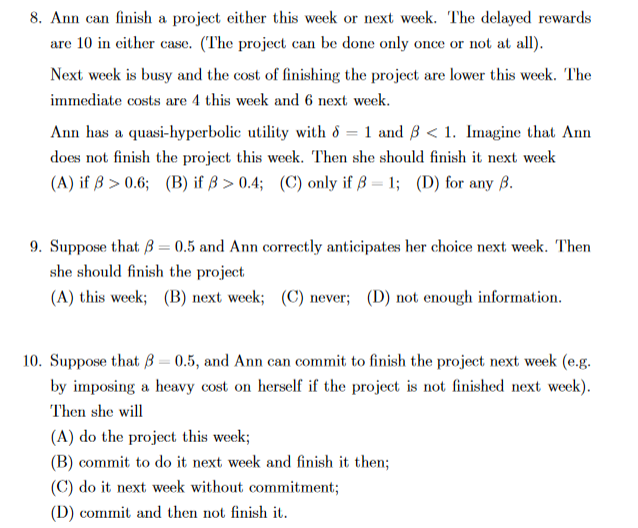8. Ann can finish a project either this week or next week. The delayed rewards are 10 in either case. (The project can be done only once or not at all). Next week is busy and the cost of finishing the project are lower this week. The immediate costs are 4 this week and 6 next week. Ann has a quasi-hyperbolic utility with & = 1 and B < 1. Imagine that Ann does not finish the project this week. Then she should finish it next week (A) if ß > 0.6; (B) if ß > 0.4; (C) only if ß = 1; (D) for any ß. 9. Suppose that B = 0.5 and Ann correctly anticipates her choice next week. Then she should finish the project (A) this week; (B) next week; (C) never; (D) not enough information. 10. Suppose that ß = 0.5, and Ann can commit to finish the project next week (e.g. by imposing a heavy cost on herself if the project is not finished next week). Then she will (A) do the project this week; (B) commit to do it next week and finish it then; (C) do it next week without commitment3; (D) commit and then not finish it.
8. Ann can finish a project either this week or next week. The delayed rewards are 10 in either case. (The project can be done only once or not at all). Next week is busy and the cost of finishing the project are lower this week. The immediate costs are 4 this week and 6 next week. Ann has a quasi-hyperbolic utility with & = 1 and B < 1. Imagine that Ann does not finish the project this week. Then she should finish it next week (A) if ß > 0.6; (B) if ß > 0.4; (C) only if ß = 1; (D) for any ß. 9. Suppose that B = 0.5 and Ann correctly anticipates her choice next week. Then she should finish the project (A) this week; (B) next week; (C) never; (D) not enough information. 10. Suppose that ß = 0.5, and Ann can commit to finish the project next week (e.g. by imposing a heavy cost on herself if the project is not finished next week). Then she will (A) do the project this week; (B) commit to do it next week and finish it then; (C) do it next week without commitment3; (D) commit and then not finish it.
Principles of Economics 2e
2nd Edition
ISBN:9781947172364
Author:Steven A. Greenlaw; David Shapiro
Publisher:Steven A. Greenlaw; David Shapiro
Chapter6: Consumer Choices
Section: Chapter Questions
Problem 1SCQ: Jeremy is deeply in love with Jasmine. Jasmine lives where cell phone coverage is poor, so he can...
Related questions
Question
#9 and 10

Transcribed Image Text:8. Ann can finish a project either this week or next week. The delayed rewards
are 10 in either case. (The project can be done only once or not at all).
Next week is busy and the cost of finishing the project are lower this week. The
immediate costs are 4 this week and 6 next week.
Ann has a quasi-hyperbolic utility with & = 1 and B < 1. Imagine that Ann
does not finish the project this week. Then she should finish it next week
(A) if ß > 0.6; (B) if ß > 0.4; (C) only if ß = 1; (D) for any ß.
9. Suppose that B = 0.5 and Ann correctly anticipates her choice next week. Then
she should finish the project
(A) this week; (B) next week; (C) never; (D) not enough information.
10. Suppose that ß = 0.5, and Ann can commit to finish the project next week (e.g.
by imposing a heavy cost on herself if the project is not finished next week).
Then she will
(A) do the project this week;
(B) commit to do it next week and finish it then;
(C) do it next week without commitment3;
(D) commit and then not finish it.
Expert Solution
This question has been solved!
Explore an expertly crafted, step-by-step solution for a thorough understanding of key concepts.
This is a popular solution!
Trending now
This is a popular solution!
Step by step
Solved in 4 steps with 2 images

Knowledge Booster
Learn more about
Need a deep-dive on the concept behind this application? Look no further. Learn more about this topic, economics and related others by exploring similar questions and additional content below.Recommended textbooks for you

Principles of Economics 2e
Economics
ISBN:
9781947172364
Author:
Steven A. Greenlaw; David Shapiro
Publisher:
OpenStax


Principles of Microeconomics
Economics
ISBN:
9781305156050
Author:
N. Gregory Mankiw
Publisher:
Cengage Learning

Principles of Economics 2e
Economics
ISBN:
9781947172364
Author:
Steven A. Greenlaw; David Shapiro
Publisher:
OpenStax


Principles of Microeconomics
Economics
ISBN:
9781305156050
Author:
N. Gregory Mankiw
Publisher:
Cengage Learning
